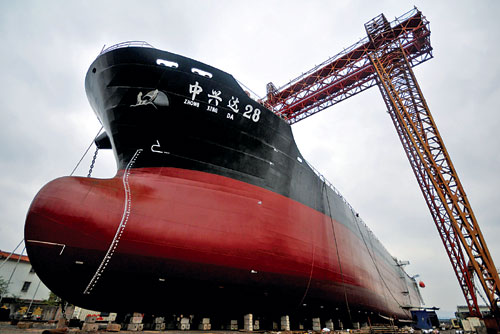Surveys reveal sharp global slowdown as crisis worsens
Updated: 2011-12-12 09:37
By Andy Bruce (China Daily)
|
|||||||||||
LONDON - Europe's debt crisis might have pushed its economy into a far steeper contraction than anyone thought and growth in China is sputtering, according to surveys that point to a sharp global slowdown taking place.
|
 |
|
A shipyard in Taizhou, Zhejiang province. The slowdown of the Chinese economy, coupled with Europe's sovereign debt crisis, is affecting the prospects for global economic growth.[Photo/China Daily] |
While there are fresh signs the US economy is perking up, business surveys on Dec 5 were mainly downbeat and confirmed the economic toll of the eurozone's sovereign debt crisis.
They come at a crucial time for resolving a debt crisis that threatens to tear apart Europe's common currency area - something that would have catastrophic implications for the world economy.
The eurozone's composite Purchasing Managers Index (PMI), while improving slightly month-on-month in November, still tallied with a 0.6 percent quarterly rate of decline for the last three months of this year.
That would be worse than any forecast from more than 30 economists in a Reuters poll last month, which projected a mere 0.1 percent decline for the fourth quarter.
In essence, it was a case of the pace of decline slowing a bit.
"Globally if you take the PMIs together, there is great concern. The upward movement in the eurozone composite PMI is just a minor blip in clearly contractionary territory," said Philip Shaw, chief economist at Investec in London.
"The Chinese situation needs to be watched as well to see if this is just a blip or part of a trend. The saving grace I guess has been the US ... where there does seem to be evidence that it is moving out of its soft patch."
There was a rare piece of good news from the United Kingdom, where its services PMI unexpectedly rose last month, suggesting the UK may avoid recession, although perhaps not stagnation.
While recession in the eurozone now looks a foregone conclusion, there are worrying signs the Chinese economy is starting to sag - perhaps unsurprising given the European Union is China's biggest export partner.
Chinese service sector growth cooled in November to its weakest pace in three months, further backing a view that authorities will have to fine-tune monetary policy again.
German Chancellor Angela Merkel met French President Nicolas Sarkozy last week to outline joint proposals for EU treaty changes that would involve tough sanctions for fiscally wasteful members.
The most recent Reuters polling of leading global economists suggests the eurozone will not survive intact in its current form, unless Europe's leaders are willing to take action on a scale not seen in the last few years.
Markit's Eurozone Composite PMI, which measures changes in business activity across the eurozone, rose slightly to 47.0 in November from October's 46.5, albeit still far below the 50 mark that divides growth from contraction.
"The major eurozone countries are all now contracting and face the risk of recession," said Chris Williamson, chief economist at survey compiler Markit.
The latest Reuters poll of economists showed a 60 percent chance the eurozone would fall into recession.
"Italy is faring the worst, with the survey suggesting that GDP could collapse by 1 percent in the fourth quarter, while both France and Spain are likely to see their economies contract by around 0.5 percent," added Williamson.
Britain's services PMI was an unexpected bright spot, rising to 52.1 in November from 51.3 in October. But survey compiler Markit said it meant the UK economy looks unlikely to grow much, taking into account some dire manufacturing data recently.
Further central bank policy easing also looks likely in China, where HSBC's services PMI fell to 52.5, a sharp decline given that October's reading was 54.1 - the highest in four months.
"With price pressures easing further, Beijing can and should use policies that are targeted on small businesses and service sectors to keep GDP growth at above 8 percent for the coming year," Qu Hongbin, HSBC's chief China economist, said in a statement.
"If the rest of the world continues to perform as badly as November's indicators have suggested, then the US renaissance could prove to be temporary," said Investec's Shaw.
Reuters
Related Stories
China boosts Latin America economy: OECD 2011-10-29 15:30
Chinese, S. African FMs talk on G20 summit 2011-10-29 11:09
WB head: Preventing crisis 'true test' for G20 2011-10-29 09:53
EU bailout fund chief eyes China investment 2011-10-28 17:36
Chernobyl film hits home in post-Fukushima Japan 2011-10-28 17:21
Stocks rise on EU debt-crisis deal 2011-10-28 08:04
- European gloom causes credit squeeze
- Reforms to target income tax system
- Surveys reveal sharp global slowdown
- Luxury brands eye record numbers
- Fiscal revenues rise 10.6% in Nov
- Dongfeng to triple own-brand vehicle sales
- Organic food gaining popularity
- A wealthier China shapes global luxury landscape








